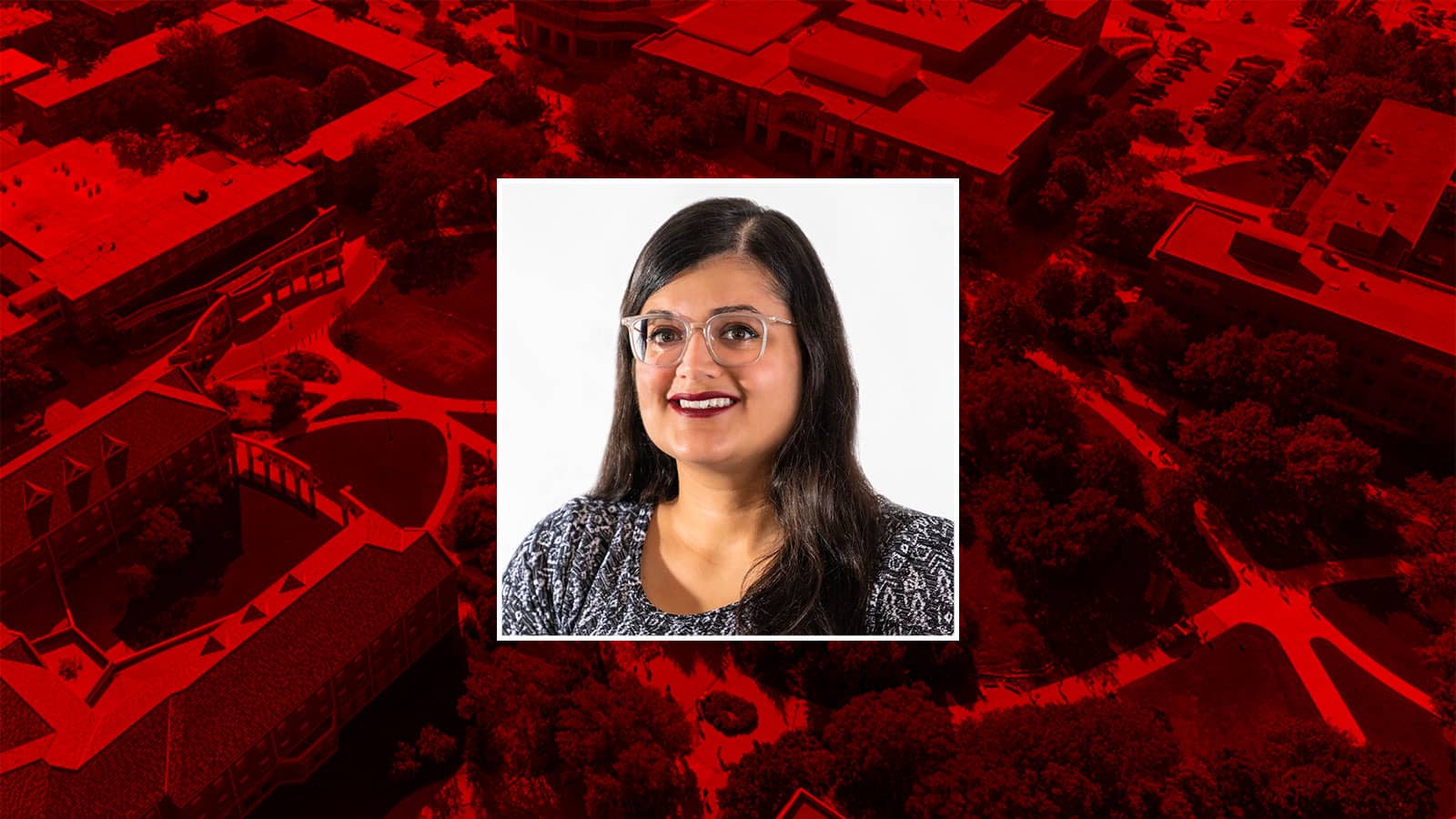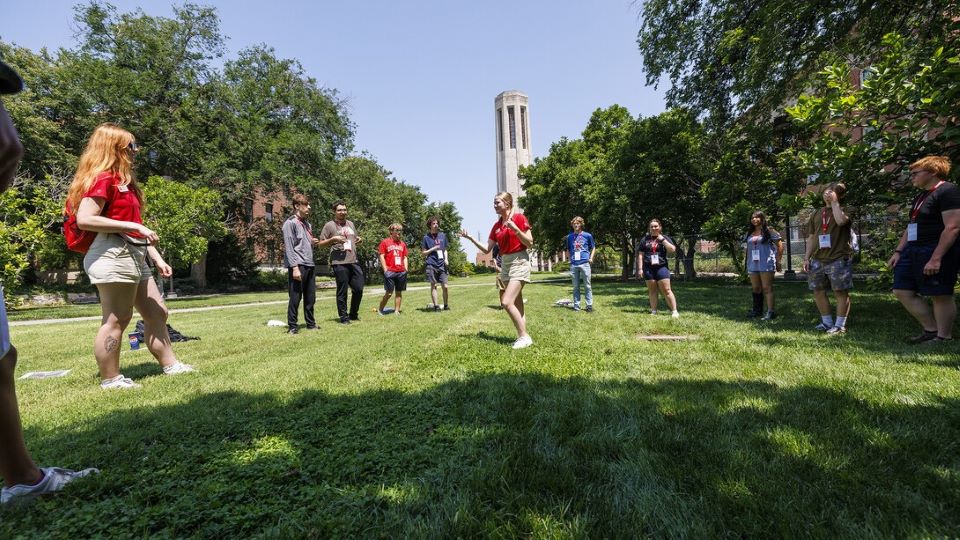
A 2015 graduate of the master’s program in composition and rhetoric, Dr. Ashanka Kumari is an assistant professor and the doctoral coordinator at Texas A&M University – Commerce. Areas of specialization in her research and teaching include first-generation-to-college graduate students, graduate student professionalization, multimodal composition and pedagogy, and the intersections among identity studies, digital literacies, and popular culture.
Dr. Kumari also serves as a Reviews section editor of Kairos: A Journal of Rhetoric, Technology, and Pedagogy, the associate copy editor for enculturation: A Journal of Rhetoric, Writing, and Culture, and is the inaugural recipient of the faculty Inclusive Excellence Champion award at Texas A&M University–Commerce.
What are you most excited about in your research and teaching?
A lot of my research is in graduate study, graduate programs; that’s what I’m interested in. My dream job was to be director of graduate studies, and now I am—I’m the doctoral coordinator. […] My dissertation actually was about the stories of first-generation-to-college doctoral students’ experiences. I ended up interviewing 22 first-generation doctoral students, because it's one thing to get a bachelor’s degree, but then, to keep going and get your master’s and Ph.D.—what leads to that? What is it like to be a first-gen person who goes through the Ph.D. and then goes into academia, or non-academia, but I think that almost all of my participants went into academia, which is a really interesting population. And what do we (first-generation graduate students) offer to our academic spaces that maybe a non-first-gen student or somebody else can’t do?
A lot of what I do in my graduate seminars is spend time talking about the structures and systems in grad school, here are things you can do, and here’s where your specific skillset or background is valued, why that matters, and how you can connect with students that way. And for a while I was the director of writing, so I would talk a lot with the teachers about that.
I often tell my story in the classroom. I always make the joke: English wasn’t my first language, it wasn’t my second language, it was my third language, and I have a Ph.D. in it. And here I am, teaching English, which—we’re not teaching the basics of the English language; that’s not what I do—but I like having that talk with students, because students always have this wide-eyed look, like, “Wait a second, you can do this and not be a perfect English speaker?” And I’m like, “Absolutely, of course you can; you can do whatever you want. It's the dream, but it depends on how you apply your background.”
We talk about immigrant narratives or social justice and diversity and inclusion and all these other topics. I think it comes up naturally, because I'm like, this is who I am. I'm putting it on a plate for you, to a certain comfort level, and they get to know me more throughout the semester. Then my students often will share little bits about themselves, like, “I'm also the first in my family to get a college degree, I never thought about that before.” And I’m like, “Mm-hmm,” and then they all realize that most of them in the room are the first. And I’m like, “We’re a university with a heavy first-generation population, and that’s a term, and here are some of the challenges that come with that term, like imposter phenomenon.” So we end up talking really frankly about, like, do you ever feel like you don’t belong in a space? And they’re like, “Yeah, we feel that all the time.”
Then we have those conversations in the classroom that I think are really valuable, that I wish I’d had more of in my own education. I think that’s a really valuable thing that first-generation people bring to the classroom. Something I wrote about in my dissertation was that a lot of times this population gets talked about as a deficit. Like, that they’re going to have struggles—the most common word is “struggles”—like, “the struggles of first-generation students include challenges fitting into academia, financial struggles, and more.” And I'm like, okay, but what do we do with this information? What does this population bring to this space, rather than, what hinders this population? I think that’s something that we (people in leadership roles in the educational system) can do better. […]
As someone with an interest in how graduate programs are run, is there any program building or planning, or other administrative professional work, that you've found exciting?
In my professional work, I think I'm most excited […] that our university’s response to the pandemic made it possible to open up job lines and to have a fresh slate in some ways, but also to end programs that weren’t working and kind of rethink the vision of departments in really good ways, and to hire our first tenure-track-line writing center director. So now they put the value on the writing center in a way that was awesome. And then last year, because we have a pretty strong graduate program ... they found money for not just one hire, but two hires.
And Nebraska was the first time I really thought about writing centers. I never worked in the writing center as a writing consultant—I took the seminar, and I worked with Rachel Azima, and I worked with the grad students there and with the other faculty, but I never actually worked at the writing center—but I remember going there every week and working with Clarence Harlan-Orsi on my writing, and it was good stuff. That was the place where I began to really value the work of a writing center, because I was like, this is a good space. The piece that I worked on every single week in Nebraska’s writing center was my first publication, and the fact that I was able to send it out as a master’s student was partly because I had that support. It was really cool, and that helped me continue to thrive in really cool ways.
So the exciting thing—to answer the question—in my professional life right now is getting to re-learn this community and build our goals together. It’s really nice to get to re-vision what we see as this department, this program, and build out classes and think about curriculum design and get to have new dynamics in the space, but also get to just build our own little community. […]
Which UNL professors had an especially positive influence on you?
I had so many good professors at Nebraska... Robert Brooke. Shari Stenberg. Stacey Waite, who I still am in contact with pretty regularly. She has a book coming out that I’m in. It was cool to hear from her about her book, and I was like, oh my gosh, I want to be part of that! Adrian Wisnicki, who I worked with a lot when I was at Nebraska; I was his research assistant, and I worked on the Livingstone Project as a full-on project person.
Those are a few that come to mind, but all of them were fantastic and had an impact on me in different ways and taught me what I know about teaching. Stacey Waite is a lot about why I go into my classroom the way I do and think about teaching the way I do, because I had her for that colloquium (ENGL 957, Composition Theory and Practice).
What experiences stand out to you as having set you on the path you’re on now?
Nebraska was the place where I found out that I love teaching. I was getting a graduate degree, because I didn’t know what else to do; I have a background in journalism, but I was like, I see myself as having more to do with research maybe. I had a research assistantship (in the first year), so I thought, let’s see what that looks like. And then I also had a teaching assistantship (in the second year), and I wasn’t sure what that would mean to me, but it clicked. I got obsessed with teaching—in good ways, I think—like building my own courses, curriculum, and thinking about, what am I going to do tomorrow in class? It was stressful, but it was a fun stress for my brain. That's the kind of thing I thrive on, when I get to build stuff, think about curriculum design and programs.
There's stuff I do here that I throw back to Nebraska a lot, like building a shared resource of teaching materials. That was something I started building for myself in Nebraska and then continued in Louisville and brought here. So now I have a massive Google Drive of stuff.
I have these biweekly check-in's with TA’s... I feel like that started in Nebraska, because Stacey Waite would always start the class like, “Let’s talk about what’s going on in your classes this week. But let’s talk about what’s actually happening, what’s challenging, and what’s not.” She also taught me it’s not your fault, it’s rarely your fault. People drop classes—it’s not your fault. People miss homework—it’s not your fault. I remember we all used to joke that we need that on a T-shirt. We can’t control everything in our classroom or in our students’ lives, and we don’t need to. Freedom is good. I think about that stuff a lot.
What was your favorite extracurricular activity?
The Writing Lincoln Initiative, because that’s the first time I got to teach. That was the year before I started teaching as a TA at Nebraska. Going to teach those fourth and fifth graders, and getting to see myself in a teaching body, but then also transitioning to teaching college students.
Those were the first moments of what is now my favorite part of my job. I always tell everybody, my favorite part of my job is not the research. Absolutely not. And I love administration, but the thing that gets me out of bed is teaching. Thinking about students and what are we going to talk about in class today, or what are we going to do next. That began at Nebraska, for sure, because I can point to specific moments where that love of teaching began and when I realized that you can do really cool things in the classroom.
It was why I kept going. Because at Nebraska, I made the choice of: Am I going to do the Ph.D. route or am I going to stop here? That was how I chose; I started teaching, and I was like, I want to keep doing this, at the college level. I remember Dr. Brooke being like, “You might want to apply to Ph.D. programs. That would be a way to do it.” And I was like, “That’s what I want to do.” So that’s what I did, and here I am. I am, fortunately, able to do that, which is pretty cool.
What were some of your favorite places in Lincoln?
There is so much good food in Lincoln. I mean, yes, there was fast food right by campus, but then you go one block over, and there’s The Coffee House. And then you go downtown, and there’s The Oven and Blue Orchid and The Mill, and all the local stuff.
And that farmer’s market. I remember walking to that early in the morning, and I was like, I will walk 30 minutes to go to the farmer’s market. Then when it would get too cold, it was like, okay, I might just have to skip it. (chuckling) It was my first time experiencing one, because I didn’t grow up with a farmer’s market; I didn’t know what they were. Then I went, and I was like, oh this is fun! There's food and samples, and you get to buy cupcakes. And then I would just wear my backpack and go to The Mill or The Coffee House and do work.
I lived at those coffee shops a lot while I was in Lincoln. I have a Coffee House shirt that Erin Cheatham and Natalie O'Neal got me as a goodbye present. I still wear it all the time, because it’s one of the best shirts. It has the Lincoln skyline on it, and I’m like, this is one of my favorite places, and it’s where I did all my work, frankly, all those coffee shops. I would hop to different ones every week, and it really helped me cultivate my own sense of what it meant for me to do my work as a researcher, or as a student, and separate work and home a little bit more.
I really like Nebraska. It was a good time. I miss a lot of the downtown area. I think about that area so much, because I live in Texas now, and you can’t just walk anywhere here. Texas is a driving state... Navigating the streets in Lincoln was scary at first, because it was all new to me. I was 14 or 15 hours from my parents, from the nearest person that I knew. I came from Alabama at the time, and my parents were in north Alabama, and my partner was 17 hours away. So we only saw each other, like, twice a year if we were lucky. Or he would come visit me. It was a really nice time and place, but it was really far from everything. But in some ways, that was good for me. That was part of why I wanted to go to Nebraska, because I was like, I kind of need to get away from the comfort zone of being only an hour or two from family and see what happens.
I'm kind of glad I did that. That's something I reflect on a lot; it was a good time, and there were a lot of good people and connections that I still keep. I still talk to Bernice Olivas regularly, for instance, and we’ve been, like, not in the same place for years. And if I see Ada Hubrig at a conference, we hit it off immediately, like we haven’t missed a beat. It’s so nice to have those kinds of connections. It was pretty cool.


